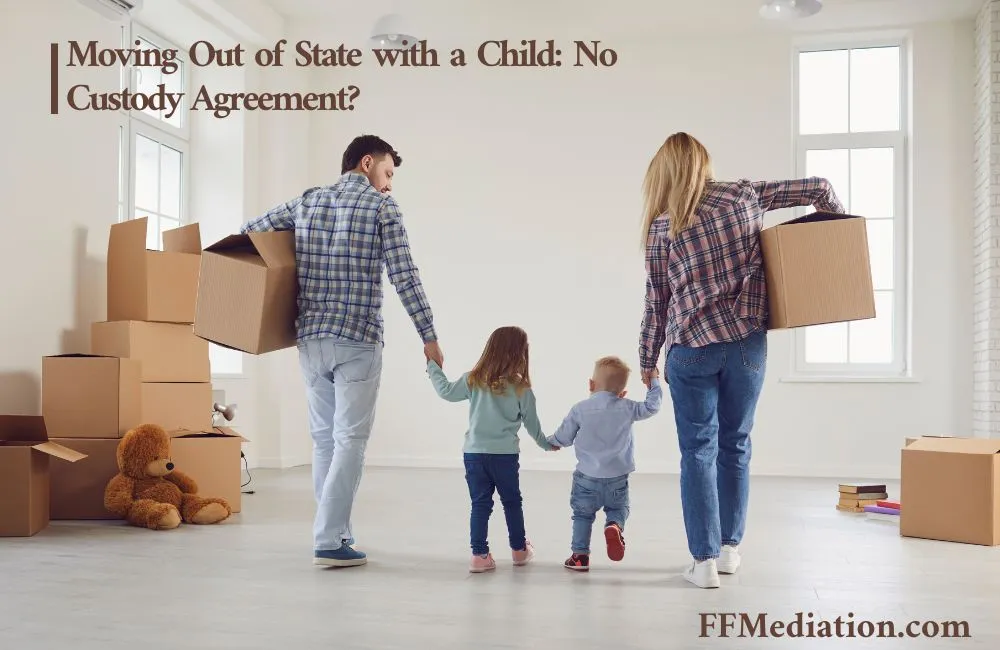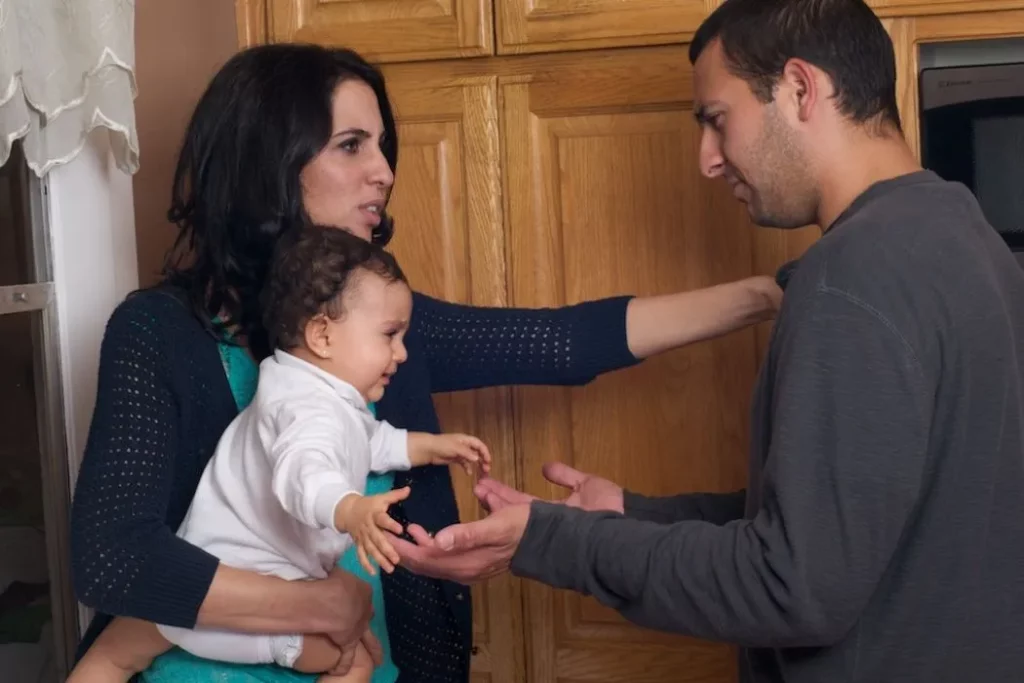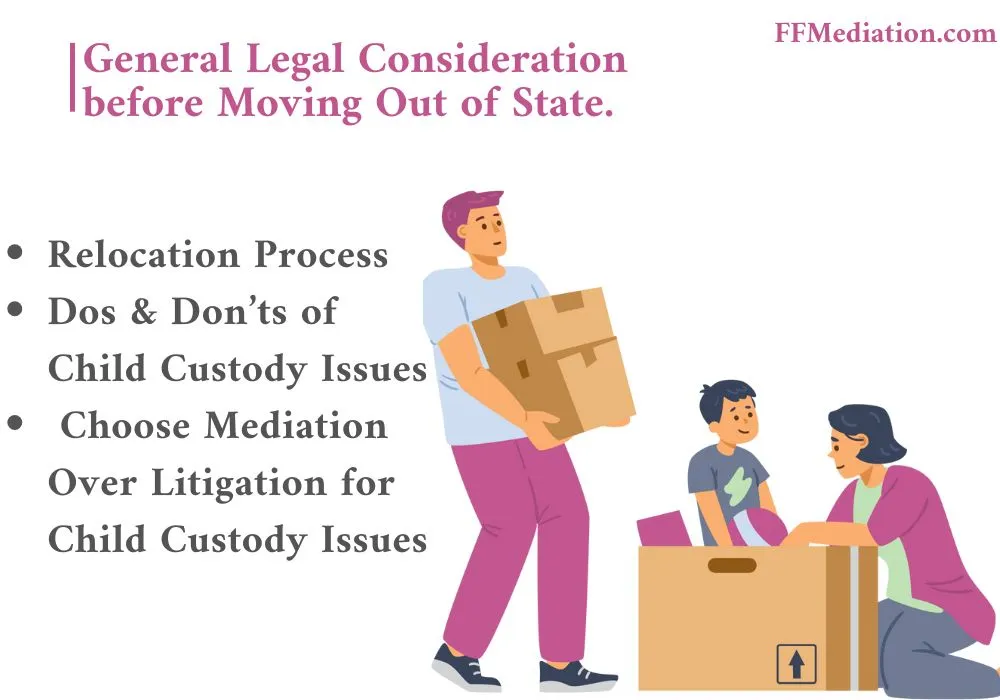
Providing Divorce Mediation Services Throughout California
Providing Divorce Mediation Services Throughout California
Home » Divorce and Family law Blog » Can You Move Out of State with a Child and No Custody Agreement?

You could be contemplating whether divorce is even worth it if you have a child with your spouse. The first thing that runs through your head is all the questions – where do I go? What do I do?
You may think that you have no options and must stay in an unhappy marriage, but that’s not true.
Mediate your child custody with Families First Mediation and skip lengthy and expensive custody battles. Schedule your FREE Divorce Mediation Consult today.

There are a few types of agreements regarding child custody. The terms ‘Custodial and non-custodial Parent‘ are often used.
In California, there is a presumption of joint custody. According to California law, there is no specific distance that a parent with joint custody can move, but it can be as little as 15 to 20 miles.
Once there is an agreement, the outcome might be different. Sometimes, according to the California Courts Self-Help Guide, some rules exist.
“Generally, a parent can change where a child lives if:
If a parent wants to relocate a child’s home to a place that is far away and interferes with the custody and visitation order, the parent may need to ask for a court order before the child can move with that parent. This is called a relocation case but is also known as a move-away case.”
Even if you do not have a custody agreement, be careful when pursuing a move with your child.

In this section, we will cover legal consideration that parents need to consider before moving out of state:
There are many, and we cannot stress this enough, many reasons that you could want to move, including for work, other family obligations, or even just to change your lifestyle. If you’re navigating a relocation or seeking guidance on rebuilding your life after separation, you may find helpful insights in our article on reconciliation and moving past divorce.
Moving is considered a big deal when it can impact the other parent’s ability to have regular and consistent time with their child. If you are considering a move, it’s best that you know why a judge would deny a relocation request.
The first thing that the court will consider is the logistics.
How far are you planning to move away?
How much traveling will the parents need to have a custody arrangement similar to the one they do now?
Will this result in only one parent in the child’s school district?
Will the move impact the child’s relationships with friends, family, and community?
There is a long list. The main thing they will focus on is stability, so they need this information to make an accurate judgment.
A judge can/will deny a parent from moving to California if:
On the topic of mediation, the Superior Court of California states, “Mediation is required by the court because approximately 65% of the cases regarding child custody and visitation are resolved in mediation, and there is no need for the parties to appear in court for an order.”
So, let us cover a few things that you should and should not do when it comes to child custody related issues in mediation:
Check out our detailed article on “Do’s and Don’ts of Child Custody Mediation” here.
If you are considering mediation, contact Dina Haddad today. She can set up a FREE Divorce Mediation Consultation and go over your case with you.
Litigation is the process of resolving a legal dispute through the court system. There are numerous disadvantages to going this route.
It is expensive, and when we say expensive, I do not mean ‘that soap is $15 expensive’. On average, each party can expect to pay $15,000.00 or more.
It is also time-consuming to wait for the courts to process your requests. A typical litigated divorce case takes one year or more.
Mediation is a non-adversarial process that can help both parents devise creative solutions to problems. It costs much less than litigation while being quicker to get through than the litigation process.
While litigation could damage your relationship with your co-parent and your kid(s), it can encourage teamwork.
The best service you could use would be Families First Mediation. It is one of the best child custody mediation services. At Families First Mediation, they genuinely consider you and your child’s well-being as the top priority. You can be done sooner than you think.
At Families First Mediation” they have established a winning formula for you to mediate not only your divorce but other agreements successfully. They are known to go above and beyond for their clients, with a 96% client satisfaction rate and 3,000+ mediated cases.
If life throws you a curveball, you can count on them to help. They are 100% committed to your success in times of hardship.
The decision is entirely up to you and your spouse. If you are looking to move and you want to hatch it out with your co-parent (or your ex-spouse you are currently divorcing) instead of going through the courts, you can opt for mediation.
There are a lot of different custody agreements you might have, but whatever the case is, your mediator can help you solve it.
Not only that, but they can even help you and your co-parent agree, creating plans for the future so that you both can move forward and create a new life with stability for your child(ren).
You will have a few things you should and should not do during the process, but as long as you try your best, that is all that matters in the end.
Mediate your child custody with Families First Mediation and skip lengthy and expensive custody battles. Schedule your FREE Divorce Mediation Consultation today.
In general, California courts will allow a parent who has sole custody of the child to move out of state unless the non-custodial parent can show that the move would be harmful for the kid(s).
But without a court order, you cannot legally move out of state without modifying your custody and visitation agreements.
Even if you aren’t the custodial parent, you still have rights (unless you directly sign them away). You have the right to object to a proposed move, but if you decide to do that, you will file a motion with the court to modify or prevent the relocation.
Technically, you can, but moving out of state without a child custody agreement or order can be more complicated.
Not only that, but it can also have severe consequences since both parents have equal custodial rights if there is no agreement.
The state will have jurisdiction over the child for some time, and it can look bad on your part if the other parent files a custody case against you. They could also get an emergency custody order to gain full custody until the court date.


Families First Mediation is a pioneer in the field of divorce mediation. Our entire divorce mediation team takes great pride in being active trainers, divorce mediators and teachers of mediation in the greater California area. If you are considering a collaborative divorce, legal seperation or looking for a san jose divorce lawyer we have services that may be beneficial to you. Take advantage of our vast expertise and background in the field of divorce mediation and our genuine desire to help with your divorce mediation services.